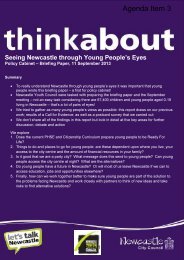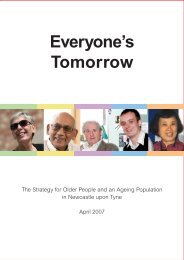NEWCASTLE'S MUSICAL HERITAGE AN INTRODUCTION By ...
NEWCASTLE'S MUSICAL HERITAGE AN INTRODUCTION By ...
NEWCASTLE'S MUSICAL HERITAGE AN INTRODUCTION By ...
You also want an ePaper? Increase the reach of your titles
YUMPU automatically turns print PDFs into web optimized ePapers that Google loves.
was commonplace in medieval thought. This period witnessed the development<br />
of instrumental music and saw the rise of the lute virtuoso, who in turn gave<br />
inspiration to other composer performers. Many of these came from the<br />
Continent and it resulted in an influx of foreign musicians engaged for their skill in<br />
performance. The early flowerings of Italian opera also began to have an<br />
influence on English music particularly solo song. The first great flowering of<br />
English music was brought to an end with the death of Purcel in 1695 and the<br />
foreign domination of musical England was to begin with the age of Handel,<br />
fifteen years later in 1710. All of this was to have an effect on musical life in<br />
Newcastle but for the time being the main formal musical activities remained with<br />
the church as it had done since the Middle Ages. In Newcastle it lay in the hands<br />
of such leading musicians of the day, whose names are inscribed in gold lettering<br />
on the entrance to the organ loft in St Nicholas Cathedral together with the date<br />
they took up their organistship).<br />
Weddell (1508)<br />
Thos Tunstall (1631)<br />
John Nichols (1636)<br />
William Hauzwell (1677)<br />
Thomas Palmer (1681)<br />
Samual Nichols (1687)<br />
Thomas Powell (1719)<br />
Such compositions of theirs that have come down to us through history are<br />
the subject of further research. Although music publishing began in the 1500s<br />
most early music of this nature is lost to us today. Few composers of any<br />
distinction have remained associated with a particular locality and achieved any<br />
sort of immortality through their music. However, there was one exception, a<br />
Newcastle composer who turned his back on London and in spite of it became<br />
widely known in English music circles in his own lifetime as much for his musical<br />
compositions as for his musical criticisms. Today his name is frequently spoken<br />
of in the same breath as the leading musicians of his time although he was never<br />
one of the inner circle. His name was Charles Avison.<br />
8

















